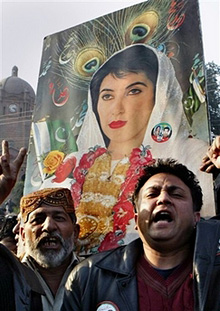 |
 |
 |
 News from Around the Americas | December 2007 News from Around the Americas | December 2007  
US Candidates Outline Plans for Stabilizing Pakistan
 David Lightman, Matt Stearns & Margaret Talev - McClatchy Newspapers David Lightman, Matt Stearns & Margaret Talev - McClatchy Newspapers
go to original


| | Supporters of slain opposition leader Benazir Bhutto chant anti government slogans during a protest rally in Lahore, Pakistan on Saturday, Dec. 29, 2007. Mass rioting following the assassination of opposition leader Benazir Bhutto has led to the deaths of 38 people and caused tens of millions of dollars in damage, the government said. (AP/K M Chaudary) |
Des Moines, Iowa - The presidential campaign erupted Friday into a full-blown debate over how best to stabilize Pakistan as candidates vied in the few days before Thursday's Iowa caucuses to show who was best prepared to lead the war on terror.

In the wake of Thursday's assassination of Pakistani opposition leader Benazir Bhutto, Republican and Democratic presidential candidates spent much of Friday laying out specific policies they would follow, or, for Democratic Illinois Sen. Barack Obama and two former Republican governors, Mike Huckabee of Arkansas and Mitt Romney of Massachusetts, trying to convince voters that they're qualified to play in that league.

The rivals with thicker foreign-policy resumes offered detailed blueprints of how they would deal with Pakistan. New Mexico Gov. Bill Richardson, a former United Nations ambassador, struck first, telling a Des Moines audience that the United States should give Pakistan "not one penny more until (President Pervez) Musharraf is gone and the rule of law is restored."

Richardson told 125 supporters at the Des Moines Botanical Garden that "some of my Democratic opponents have misplaced faith in Musharraf. Like the Bush administration, they cling to a misguided notion that Musharraf can be trusted as an ally to fight terrorism or change his despotic ways."

Most Democratic candidates wouldn't go that far; New York Sen. Hillary Clinton offered a multipart plan to restore stability but stopped short of calling for Musharraf's ouster.

At a visit in Story City, she called for a "full, independent, international investigation, perhaps along the lines of what the United Nations has been doing with respect to the assassination of Prime Minister Hariri in Lebanon." (Former Lebanese Prime Minister Rafik al Hariri was killed in an explosion in 2005.)

Clinton also called for appointment of a high-level presidential envoy, perhaps a retired general, to work with Musharraf; Pakistan elections with international monitors "as soon as practicable"; and an effort to "speak directly to the people of Pakistan, particularly the middle class."

Other candidates joined the fray. Senate Foreign Relations Committee Chairman Joseph Biden, D-Del., urged putting new pressure on Musharraf to hold "fair elections as soon as possible," while Sen. Christopher Dodd, D-Conn., a senior Foreign Relations member, urged that Pakistan's elections be postponed.

The fight was not just over ideas, it was over foreign-policy pedigree, too. Dodd took aim at Clinton, questioning her experience.

"It isn't enough to be sitting on the sidelines, watching your husband deal with these problems over the years," Dodd said. He termed Richardson's call for Musharraf to resign "a dangerous idea. Tell me who's going to be controlling the keys to the nuclear weapons in Pakistan."

Also throwing jabs was Obama, though the third-year U.S. senator did not offer any specific blueprint to stabilize Pakistan.

At a morning stop in Williamsburg, he said that as president he would reassess U.S. policy toward Pakistan and push for democratic elections.

The Republican debate had a different tone. Most candidates were more willing to tolerate, and in some cases even praise, Musharraf, while they painted Democrats as unsteady and weak.

"I don't think it would be a good idea to call for him (Musharraf) to step down now," former Tennessee Sen. Fred Thompson told CNN on Friday. "I hope that we as candidates out here don't start lobbing these ideas that get plenty of attention but are not very sound. This is a serious matter. It's going to be with us for some time, and we need to be deliberate in our approach to it because we have several interests involved."

Arizona Sen. John McCain, who has stressed his support for the Iraq war and his deep background in national security throughout his campaign, also focused on Pakistan.

"You're going to hear a lot of criticism about Musharraf, that he hasn't done everything we wanted him to do, but he did agree to step down as head of the military and he did get the elections," the senator told his Iowa audience.

Romney stressed his experience as a business executive, saying he could put together "a great team" to help manage crises, while Huckabee linked the assassination to illegal immigration, saying it highlighted the importance of securing the nation's borders by building a fence along the Mexican border. | 
 | |
 |



